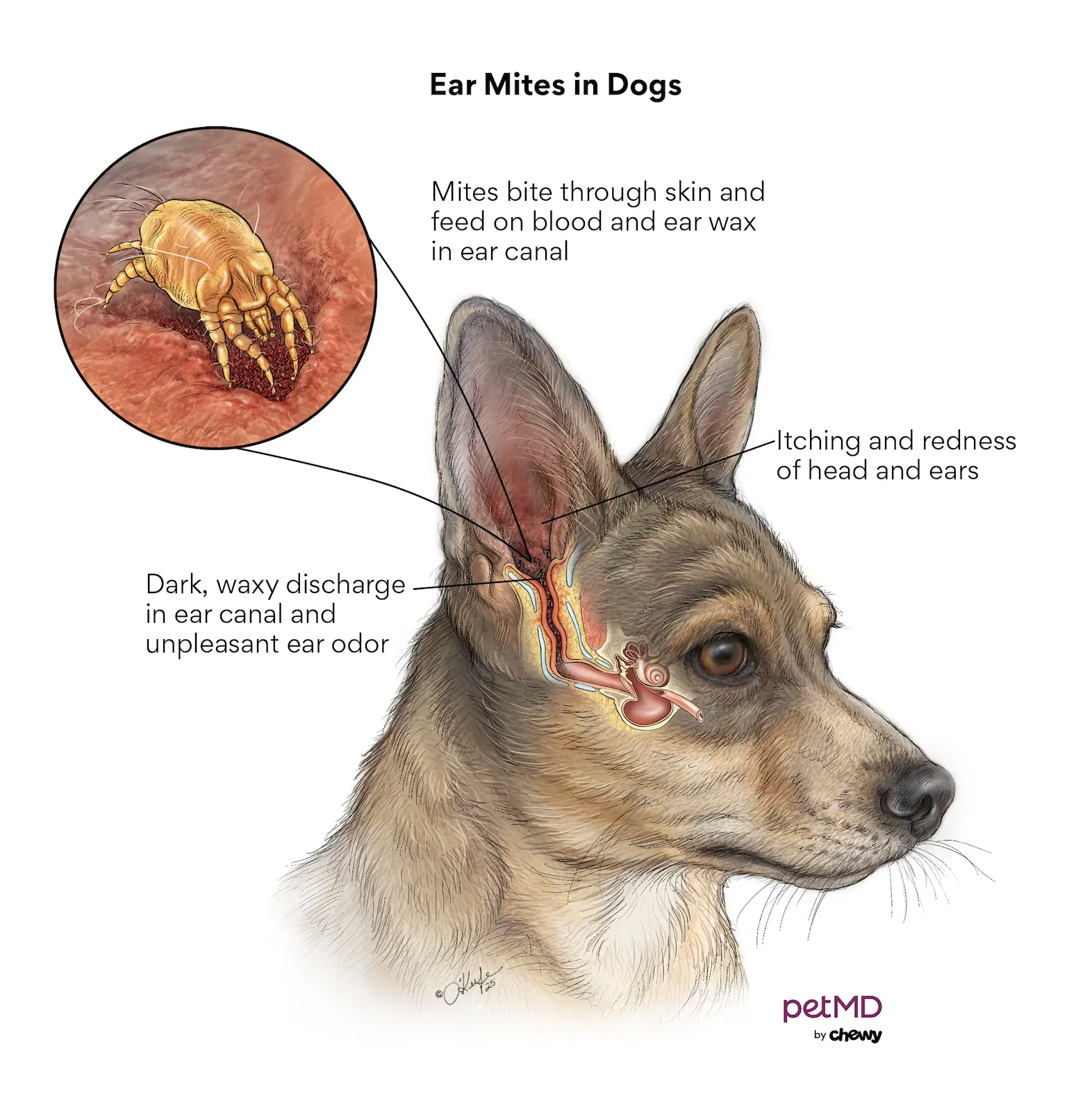If you’ve noticed your dog excessively scratching their ears or shaking their head, ear mites could be the reason. These tiny parasites cause intense itching and discomfort, making it crucial to address them promptly. While ear mites aren’t a medical emergency, they significantly impact your dog’s quality of life and can lead to secondary infections if left untreated. Understanding the Best Way To Kill Ear Mites In Dogs involves proper diagnosis, treatment, and preventative measures.
 ear mites in dogs; a diagram with a dog that has mites within his ear.
ear mites in dogs; a diagram with a dog that has mites within his ear.
Recognizing the Symptoms of Ear Mites
Identifying ear mites early is key to effective treatment. Common symptoms include:
- Frequent head shaking
- Persistent scratching at the ears
- Redness and inflammation inside the ear
- A distinct ear odor
- A dark brown or black waxy discharge resembling coffee grounds
- Sensitivity or pain when the ears are touched
- In some cases, loss of hair around the ears due to excessive scratching.
If you observe these signs, consulting your veterinarian for a definitive diagnosis is essential.
Understanding the Causes and Transmission
Ear mites are highly contagious and primarily spread through direct contact with an infected animal. Dogs can easily contract them from other dogs, cats, or even from contaminated environments like bedding or shared toys. Interestingly, while ear mites are highly contagious, can humans get ear mites from a dog is a common question. The answer is that it’s highly unlikely, although temporary skin irritation could occur if a mite accidentally transfers to a person.
Puppies and dogs that spend a lot of time outdoors are particularly susceptible. Furthermore, dogs not on regular flea, tick, and heartworm preventatives have a higher risk of infestation.
Diagnosing Ear Mites: What to Expect at the Vet
To accurately diagnose ear mites, your veterinarian will perform a thorough examination of your dog’s ears using an otoscope. This instrument allows them to visualize the ear canal and identify any signs of mites or inflammation.
The veterinarian will likely collect a sample of ear debris for microscopic examination. This “ear cytology” involves mixing the debris with mineral oil on a slide to search for live mites or their eggs. The sample may also be stained to check for secondary yeast or bacterial infections, which are common in dogs with ear mites.
The Best Way to Kill Ear Mites: Treatment Options
Effective treatment involves a two-pronged approach: cleaning the ears and administering medication to kill the mites.
1. Professional Ear Cleaning
Your vet will likely begin by thoroughly cleaning your dog’s ears with a specialized ear cleanser. This step removes debris and wax buildup, allowing the medication to penetrate effectively. Common cleansers include Epi-Otic® Advanced or, if a bacterial infection is present, TrizULTRA™+ Keto Flush.
2. Medication
The primary treatment for ear mites involves using topical or oral flea, tick, and heartworm preventatives. While not always specifically labeled for ear mites, these medications contain ingredients that are highly effective at eliminating them. This is considered off-label use but is safe and common under veterinary guidance. Two commonly used products are Bravecto® and Advantage Multi™.
In cases of secondary bacterial or yeast infections, your veterinarian might prescribe a topical ointment like Animax®. This is typically applied to the ear canals after cleaning, twice daily for a week. For dogs experiencing significant pain or itching, topical or oral steroids like prednisone may be prescribed to provide relief. Is it safe if my dog has giardia and now i have diarrhea? It is advisable to contact your vet for consultation.
3. Treating All Pets
Given the highly contagious nature of ear mites, treating all pets in the household is crucial, even if they don’t show symptoms. This prevents re-infestation and ensures complete eradication of the mites. The question of can lice on dogs transfer to humans is often asked, and while dog lice are species-specific and cannot live on humans, ear mites are still a potential (though rare) irritant.
Recovery and Ongoing Management
Most dogs experience relief within a day or two of starting treatment. However, it can take up to 30 days for the ear mites to be completely eliminated. A follow-up visit to your veterinarian for a repeat ear cytology is essential to confirm that the mites are gone. If symptoms persist or the cytology reveals remaining mites or infection, another round of treatment may be necessary.
Preventing Ear Mites: A Proactive Approach
Prevention is always better than cure. The best way to prevent ear mites in dogs includes:
- Year-Round Preventatives: Consistent use of flea, tick, and heartworm preventatives provides ongoing protection.
- Regular Ear Cleaning: Weekly cleaning helps remove debris and reduces the risk of infection. Be gentle and avoid inserting anything too far into the ear canal.
- Environmental Hygiene: Regularly washing your dog’s bedding and toys can help eliminate potential sources of infestation.
FAQs About Ear Mites in Dogs
Can ear mites infest my house?
Ear mites can survive for a short period in the environment, particularly in bedding and toys. Thorough cleaning and disinfection can eliminate them.
Can humans catch ear mites from dogs?
While uncommon, ear mites can occasionally cause temporary itching or skin rash in humans if they transfer from a dog. Can you get head lice from a dog? No, head lice are species-specific to humans.
Do I need a vet to treat ear mites?
Yes, veterinary treatment is essential for ear mites. Prescription medications are typically required to effectively kill the mites and manage any secondary infections.
By understanding the symptoms, causes, treatment options, and preventative measures, you can effectively protect your dog from the discomfort and potential complications of ear mites. Regular veterinary check-ups and proactive care are key to keeping your furry friend happy and healthy.
